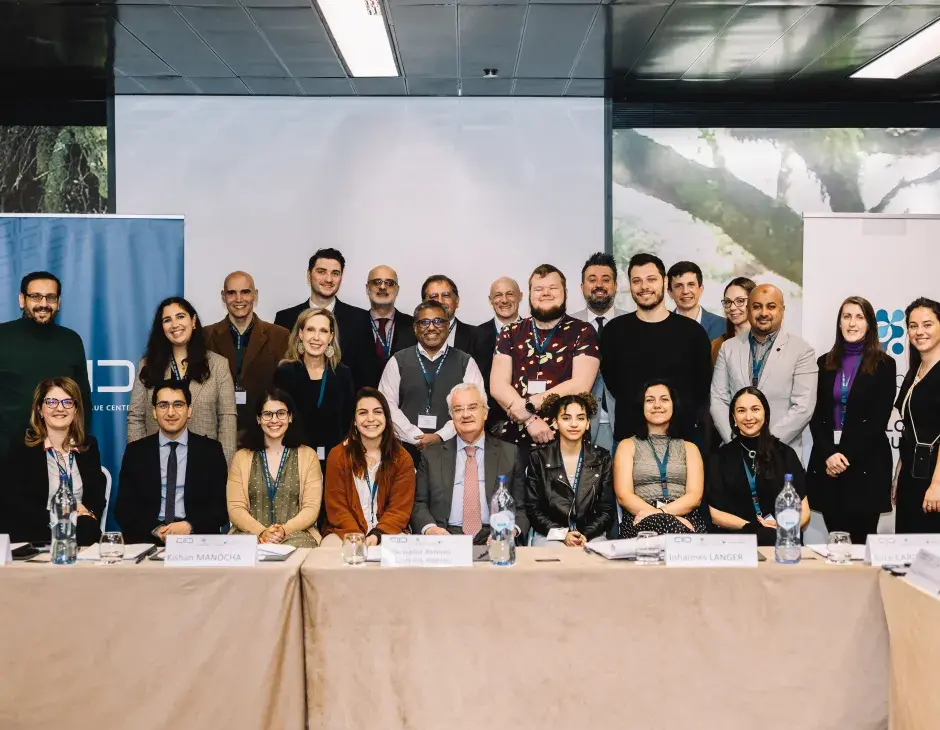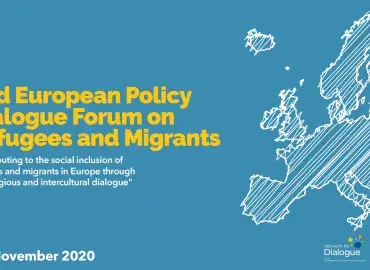Expert Meeting Ahead of European Policy Dialogue Forum Focuses on the Needs of Young Refugees
Youth unemployment, access to affordable and quality education, and disengagement from political and cultural life are urgent challenges facing young refugees in Europe, participants heard at an expert meeting ahead of the fifth European Policy Dialogue Forum.
The event gathered 25 representatives from intergovernmental organizations and academic institutions, as well as youth delegates and religious actors. It was hosted by the International Dialogue Centre (KAICIID) and the Network for Dialogue in partnership with the European Council of Religious Leaders/Religions for Peace Europe (ECRL/RfP Europe) and with the support of the OSCE Office for Democratic Institutions and Human Rights (ODIHR). The meeting forms part of the preparatory process for the annual Forum which will be held in Ghent later this year.
4 out of 5 asylum seekers in the European Union under the age of 35
According to EUROSTAT, around 4 in 5 first time asylum seekers in the EU are under the age of 35. Approximately one-quarter are under the age of 18. Over the past year, war in Ukraine has sent thousands of young people fleeing into neighbouring countries across the continent.
Opening the Forum, KAICIID’s Deputy Secretary General Ambassador António de Almeida-Ribeiro told participants that during mass arrivals, there is a logical tendency to focus on immediate needs versus long-term integration.
“The role of young people as key actors in building inclusive, cohesive and peaceful societies is often ignored or rarely recognized. Fostering effective social inclusion at such an unprecedented time is a shared responsibility which requires the collaboration of faith-based and secular actors alike. This is precisely what the annual European Policy Dialogue Forum is about,” he said.
Yet social inclusion does not come easy. The Agency for Fundamental Rights (FRA) has identified serious challenges in integrating people aged 16 to 24 across the EU. Among them are incoherent policies, limited services like language classes and difficulties navigating an administrative maze to obtain critical documentation. This can result in young people feeling completely isolated from their European host communities, which leads to discontentment and in worst case scenarios can fuel extremism.
According to Johannes Langer, Senior Programme Manager for the Europe Programme at KAICIID, there is a growing trend of young refugees and migrants across Europe facing social exclusion, which is exactly why this year’s Forum decided to focus on young people.
“Many have fled conflict and trauma and now face difficulty accessing the building blocks of meaningful community participation – education, employment, and participation in the policies that shape their daily lives,” he said.
That participation, says Aleksandra Djuric Milovanović, Project Manager for the Network for Dialogue, has to be reflected in expert meetings such as this one.
"We often talk about young people, but we barely ever talk with young people"
For the first time, at a pre-Forum meeting, 30 per cent of the participants were under the age of 30. Langer says this is critical because young people are often the subject of policy debates but are hardly ever involved themselves. “We often talk about young people, but we barely ever talk with young people,” he said.

Young delegates spoke at meeting sessions focused on removing barriers to employment and education and explained how other factors like gender, ethnicity and religious affiliation affect societal exclusion.
18-year old Marwa Achimrar from the European Peer Training Organization was one of them.
“A key issue is that young people from my generation often do not know who the need to speak to to be heard. Another issue is that we are often not enough informed about how politics work and how we, as young people, can make our voices heard. What makes me feel comfortable about being here is that we are here to be heard, which is pretty cool”, she said.
Participants also discussed using interreligious dialogue to combat hate speech and Xenophobia and provide safe emotional and physical spaces for young refugees to share trauma and frustration.
Building on last year’s Forum theme of improving refugee integration in cities, the final session of the day explored how cities and local governments can improve inclusion for young people, as well as how faith-based actors can support these endeavours.
Seven policy briefs the result of EPDF recommendations
As in previous years, these discussions will form the basis for policy recommendations, as well as dedicated workshops throughout the year. Although these culminate with the annual Forum, Djuric says the preparatory and follow up processes are equally important. So far, seven policy briefs have been produced based on the recommendations of previous Forums.
“Participation is an excellent start, but it’s only effective if there is policy change. At the same time, cities and national governments are eager for solutions to the challenges they are facing with integration. The Forum is determined that the recommendations offered by our experts and youth delegates transform local governments all the way up to the EU level,” Djuric said.
Ambassador Almeida-Ribeiro also highlighted that last year, the European Commission conducted a survey with young people for the 2022 European Year of Youth. Their expectation: for decisionmakers to listen to their recommendations and act on them.
“Young people are increasingly engaged in the future of European societies,” Ambassador Almeida-Ribeiro said. “They care, but they want to be heard.”
On 3-4 November policymakers, religious leaders, academics and representatives of secular and faith-based…


